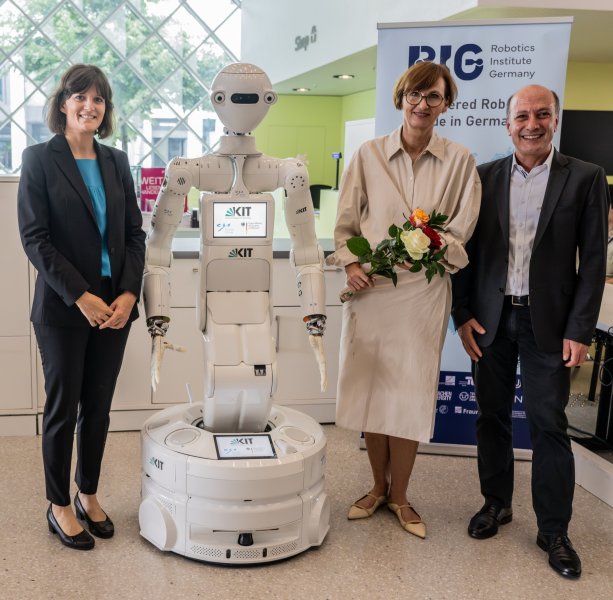· News
ROBDEKON at the AI-based Robotics Conference
Robot-assisted decontamination technologies presented in a talk and live exhibit: At the first conference for »AI-based robotics« (KIRO2024) organized by the Federal Ministry of Education and Research (BMBF) and the Federal Ministry for Economic Affairs and Climate Action (BMWK) in Berlin, ROBDEKON presented the status of its developments.
Learning from successful grasping actions
In his talk, ROBDEKON spokesperson and Fraunhofer IOSB institute director Prof. Jürgen Beyerer provided an insight into the technologies and platforms that the competence center is researching. The aim is to use artificial intelligence to enable robots to independently master complex tasks in unstructured and dynamic environments, in order to reduce the burden on humans and keep them out of danger zones. The robots learn by themselves to store and improve successful grasping actions. Built-in AI algorithms help with the perception of the surroundings and the visual recognition of hazardous objects.
Live exhibit: salvaging barrels at a distance of 500 km
In addition to the talk, conference participants in Berlin experienced the autonomous excavator ALICE (Autonomous Large Intelligent Crawler Excavator) as a live exhibit: In the accompanying exhibition, visitors could use a laptop to instruct the excavator to recover barrels. ALICE itself was located 500 kilometers away in Karlsruhe and carried out the requested maneuvers independently, which the participants could again follow live via video link.
The aim of the conference was to bring together robotics experts from business and science in order to secure the long-term competitiveness and sovereignty of Germany and Europe in the field of AI-based robotics.
Bundled robotics expertise in the new Robotics Institute
The conference also marked the launch of the Robotics Institute Germany (RIG), which brings together Germany's leading institutions in the field of robotics research and creates a central point of contact. The competence network, which is managed by the Technical University of Munich (TUM), will drive forward cutting-edge research, talent development and innovation in Germany in the field of AI-based robotics and will receive funding of 20 million euros from the BMBF for four years.

The spokesperson for the RIG is Professor Tamim Asfour, who has been involved in ROBDEKON from the very beginning. He holds the Chair of High-Performance Humanoid Technologies (H²T) at the Karlsruhe Institute of Technology (KIT). He describes the objective of the new virtual institute as follows: »We will establish the RIG as a nationally recognized and internationally unique institute that designs cutting-edge research, education and innovation in AI-based robotics and aligns it with the needs of Germany.« Fraunhofer IOSB, as the lead partner of ROBDEKON, is also part of RIG and will link the laboratory for autonomous construction machines, which was built in ROBDEKON under the direction of Dr.-Ing. Janko Petereit, with other infrastructures and expand it into a laboratory for large-scale robotics.